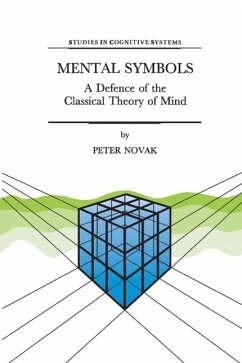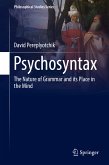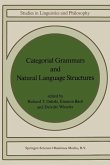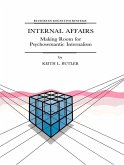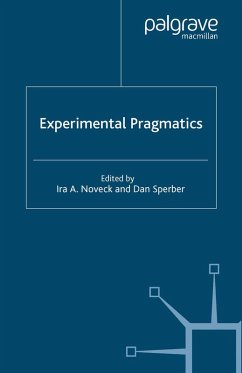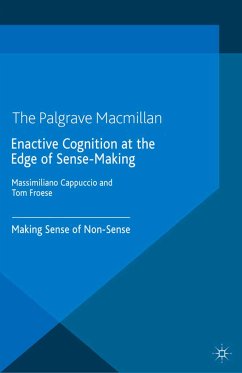73,95 €
73,95 €
inkl. MwSt.
Sofort per Download lieferbar

37 °P sammeln
73,95 €
Als Download kaufen

73,95 €
inkl. MwSt.
Sofort per Download lieferbar

37 °P sammeln
Jetzt verschenken
Alle Infos zum eBook verschenken
73,95 €
inkl. MwSt.
Sofort per Download lieferbar
Alle Infos zum eBook verschenken

37 °P sammeln
- Format: PDF
- Merkliste
- Auf die Merkliste
- Bewerten Bewerten
- Teilen
- Produkt teilen
- Produkterinnerung
- Produkterinnerung

Bitte loggen Sie sich zunächst in Ihr Kundenkonto ein oder registrieren Sie sich bei
bücher.de, um das eBook-Abo tolino select nutzen zu können.
Hier können Sie sich einloggen
Hier können Sie sich einloggen
Sie sind bereits eingeloggt. Klicken Sie auf 2. tolino select Abo, um fortzufahren.

Bitte loggen Sie sich zunächst in Ihr Kundenkonto ein oder registrieren Sie sich bei bücher.de, um das eBook-Abo tolino select nutzen zu können.
Mental Symbols is an essay on mind and meaning, on the biological implementation of mental symbols, on the architecture of mind, and on the correct construal of logical properties and relations of symbols, including implication and inference. The book argues against the main contemporary trends in the cognitive sciences, preferring rather the classical early-modern tradition. The author looks at some logical paradoxes in the light of that tradition, and offers a novel answer to the problem of the biological implementation of the mind in the brain.
- Geräte: PC
- ohne Kopierschutz
- eBook Hilfe
- Größe: 31.41MB
Andere Kunden interessierten sich auch für
![Psychosyntax (eBook, PDF) Psychosyntax (eBook, PDF)]() David PereplyotchikPsychosyntax (eBook, PDF)73,95 €
David PereplyotchikPsychosyntax (eBook, PDF)73,95 €![Categorial Grammars and Natural Language Structures (eBook, PDF) Categorial Grammars and Natural Language Structures (eBook, PDF)]() Categorial Grammars and Natural Language Structures (eBook, PDF)161,95 €
Categorial Grammars and Natural Language Structures (eBook, PDF)161,95 €![Internal Affairs (eBook, PDF) Internal Affairs (eBook, PDF)]() K. L. ButlerInternal Affairs (eBook, PDF)73,95 €
K. L. ButlerInternal Affairs (eBook, PDF)73,95 €![Experimental Pragmatics (eBook, PDF) Experimental Pragmatics (eBook, PDF)]() Experimental Pragmatics (eBook, PDF)73,95 €
Experimental Pragmatics (eBook, PDF)73,95 €![Naming the Rainbow (eBook, PDF) Naming the Rainbow (eBook, PDF)]() D. DedrickNaming the Rainbow (eBook, PDF)73,95 €
D. DedrickNaming the Rainbow (eBook, PDF)73,95 €![Sabdaprama¿a: Word and Knowledge (eBook, PDF) Sabdaprama¿a: Word and Knowledge (eBook, PDF)]() P. P. BilimoriaSabdaprama¿a: Word and Knowledge (eBook, PDF)40,95 €
P. P. BilimoriaSabdaprama¿a: Word and Knowledge (eBook, PDF)40,95 €![Enactive Cognition at the Edge of Sense-Making (eBook, PDF) Enactive Cognition at the Edge of Sense-Making (eBook, PDF)]() Enactive Cognition at the Edge of Sense-Making (eBook, PDF)73,95 €
Enactive Cognition at the Edge of Sense-Making (eBook, PDF)73,95 €-
-
-
Mental Symbols is an essay on mind and meaning, on the biological implementation of mental symbols, on the architecture of mind, and on the correct construal of logical properties and relations of symbols, including implication and inference. The book argues against the main contemporary trends in the cognitive sciences, preferring rather the classical early-modern tradition. The author looks at some logical paradoxes in the light of that tradition, and offers a novel answer to the problem of the biological implementation of the mind in the brain.
Dieser Download kann aus rechtlichen Gründen nur mit Rechnungsadresse in A, B, BG, CY, CZ, D, DK, EW, E, FIN, F, GR, HR, H, IRL, I, LT, L, LR, M, NL, PL, P, R, S, SLO, SK ausgeliefert werden.
Produktdetails
- Produktdetails
- Verlag: Springer Netherlands
- Seitenzahl: 267
- Erscheinungstermin: 6. Dezember 2012
- Englisch
- ISBN-13: 9789401156325
- Artikelnr.: 43984702
- Verlag: Springer Netherlands
- Seitenzahl: 267
- Erscheinungstermin: 6. Dezember 2012
- Englisch
- ISBN-13: 9789401156325
- Artikelnr.: 43984702
- Herstellerkennzeichnung Die Herstellerinformationen sind derzeit nicht verfügbar.
1 Conservative Rationalism I.- 1.1 Common-sense Psychology.- 1.2 The Supervenience Chain.- 1.3 The Nomic Theory of Reference.- 1.4 Casus Belli.- 1.5 Nomenclature.- 2 The Idea as World and Will A Belief in a Contribution of Environment to Meaning and a Division of Semantic Labour.- 2.1 The Ambiguous Meaning of "Meaning ".- 2.2 The Will to Linguistic Power.- 3 Sentence-based Semantics Early Steps toward Semantic Holism.- 3.1 Motivation for Semantic Holism.- 3.2 Frege on Term-based Semantics.- 3.3 Russell on Term-based Semantics.- 3.4 Carnap'Semantic Verificationism.- 4 Radical Empiricism I.- 4.1 Meaning and Non-existent Entities.- 4.2 The Separation of Meaning and Reference.- 4.3 Mental and Mind-Independent Semantic Universals.- 5 Radical Empiricism II.- 5.1 Two Major Routes to Semantic Holism.- 5.2 The Route from Verificationism to Holism.- 5.3 The Route from Behaviourism to Holism.- 5.4 Remarks on Middlebrow Pragmatism.- 6 Conservative Rationalism II.- 6.1 The Old Sorcerer's Supervenience Chain.- 6.2 Misrepresentation and Asymmetric Dependence.- 6.3 The Sociological Phase of Reference.- 7 The Classical Theory of Mind I.- 7.1 Five Ways of Defining Logical Modality.- 7.2 The Classical Theory of Mind.- 7.3 The Classical Theory of Representation.- 7.4 Aspects of the Classical Theory of Knowledge.- 7.5 Modal Properties in the Model Code.- 7.6 The Complex Ideas of Implication.- 7.7 The Complex A Priori Idea of Valid Deductive Inference.- 7.8 Remarks on CTM and Analytic Philosophy.- 8 The Classical Theory of Mind II.- 8.1 The Ontology and Architecture of CTM.- 8.2 Learning, Memory, and Association in Aplysia.- 8.3 Learning, Memory, and Association in Vertebrates.- 8.4 The Genetic Code, the Mental Code.- 8.5 History, Histology, and the Molecular Level of Analysis.- 9The Classical Theory of Mind III.- 9.1 Toward an Integrated Account of Mind.- 9.2 The Symbolic System of a Deep-layer, Long-term-store Psychic Cell.- 9.3 The Mind as a System of Psychic Cells.- 9.4 The Mind and its External Affairs.- 10 The Tale of Russell's Paradox.- 10.1 The Misty Origins of Analytic Philosophy.- 10.2 Russell's Sophism in the Classical Theory of Mind.- 10.3 The Well-Formedness of the Mind.- Epilogue.
1 Conservative Rationalism I.- 1.1 Common-sense Psychology.- 1.2 The Supervenience Chain.- 1.3 The Nomic Theory of Reference.- 1.4 Casus Belli.- 1.5 Nomenclature.- 2 The Idea as World and Will A Belief in a Contribution of Environment to Meaning and a Division of Semantic Labour.- 2.1 The Ambiguous Meaning of "Meaning ".- 2.2 The Will to Linguistic Power.- 3 Sentence-based Semantics Early Steps toward Semantic Holism.- 3.1 Motivation for Semantic Holism.- 3.2 Frege on Term-based Semantics.- 3.3 Russell on Term-based Semantics.- 3.4 Carnap'Semantic Verificationism.- 4 Radical Empiricism I.- 4.1 Meaning and Non-existent Entities.- 4.2 The Separation of Meaning and Reference.- 4.3 Mental and Mind-Independent Semantic Universals.- 5 Radical Empiricism II.- 5.1 Two Major Routes to Semantic Holism.- 5.2 The Route from Verificationism to Holism.- 5.3 The Route from Behaviourism to Holism.- 5.4 Remarks on Middlebrow Pragmatism.- 6 Conservative Rationalism II.- 6.1 The Old Sorcerer's Supervenience Chain.- 6.2 Misrepresentation and Asymmetric Dependence.- 6.3 The Sociological Phase of Reference.- 7 The Classical Theory of Mind I.- 7.1 Five Ways of Defining Logical Modality.- 7.2 The Classical Theory of Mind.- 7.3 The Classical Theory of Representation.- 7.4 Aspects of the Classical Theory of Knowledge.- 7.5 Modal Properties in the Model Code.- 7.6 The Complex Ideas of Implication.- 7.7 The Complex A Priori Idea of Valid Deductive Inference.- 7.8 Remarks on CTM and Analytic Philosophy.- 8 The Classical Theory of Mind II.- 8.1 The Ontology and Architecture of CTM.- 8.2 Learning, Memory, and Association in Aplysia.- 8.3 Learning, Memory, and Association in Vertebrates.- 8.4 The Genetic Code, the Mental Code.- 8.5 History, Histology, and the Molecular Level of Analysis.- 9The Classical Theory of Mind III.- 9.1 Toward an Integrated Account of Mind.- 9.2 The Symbolic System of a Deep-layer, Long-term-store Psychic Cell.- 9.3 The Mind as a System of Psychic Cells.- 9.4 The Mind and its External Affairs.- 10 The Tale of Russell's Paradox.- 10.1 The Misty Origins of Analytic Philosophy.- 10.2 Russell's Sophism in the Classical Theory of Mind.- 10.3 The Well-Formedness of the Mind.- Epilogue.
